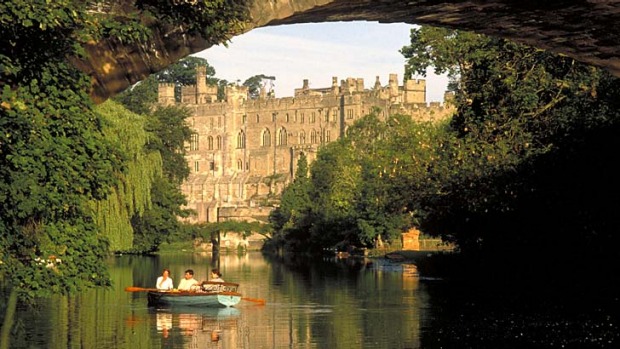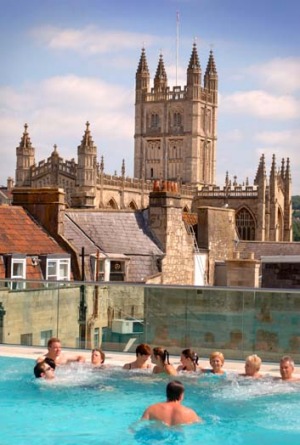
Mark Juddery hops on the train to find a respite from the crowds in London's satellite towns.
Exciting as the London Olympics will be, it's worth remembering that the city will almost certainly be chaos. London traffic is crazy at the best of times, and with an extra 11 million people visiting, this will not be the best of times.
Happily, for those who want respite from the city, during the Olympics or at any time, London is surrounded by satellite towns that are less than two hours away and worth a visit, with inexpensive trains to and from the city that are less manic than the Tube.

England offers abundant history and Warwick, 80 minutes' north-west of London by train, promotes its history more blatantly than many other towns. Among its splendid buildings, the highlight is the mediaeval Warwick Castle.
It is probably the region's most impressive castle, but Warwickshire county has attempted to remove all doubt by calling it "Britain's ultimate castle" and turning it into a child-friendly attraction with a falconry, playgrounds, special tours (focusing on ghost stories and hideous tales of torture, as loved by children) and additions based on the television shows Merlin and Horrible Histories.
Educational? Sure, but the kids will be having too much fun to notice.

All this frivolity might upstage the fact that, a few minutes' walk from the castle, Warwick is an archetypal English town, with a busy Saturday market, cosy cafes, friendly B&Bs and beautiful parks.
visitwarwick.co.uk
One hour east of London, Canterbury is famous for two things: the site of Chaucer's Canterbury Tales (perhaps Britain's most celebrated pre-Shakespeare literary work) and the magnificent Canterbury Cathedral, which dates from Norman times and towers over the town. Whatever your religion, it is worth visiting for the sheer spectacle. The surrounding town is amiable, relaxed and - while not exactly frozen in time - possesses enough heritage sites (Canterbury Castle, Greyfriars Chapel, Eastbridge Hospital) to intrigue fans of mediaeval history - and in the underground Roman Museum, even earlier times.
Canterbury is within 15 minutes' drive of pleasant countryside in any direction, the fishing town of Whitstable, or the seaside town of Herne Bay.

Of course, no Australian would go to England to visit a beach. That would be like an Englishman coming here to see the castles.
Still, visitors can escape the mild English summer by visiting Herne Bay, or going south-east to Dover, site of the white cliffs.
canterbury.co.uk
Of all Roman cities, few hold a candle to Bath. (Well, perhaps Rome does.) A popular stopover in the heyday of the Roman Empire, Bath maintained its classical architecture for centuries, so that buildings such as the Bath Abbey Church (circa 1502) seem more like well-preserved relics. Indeed, Bath might well be the prettiest city in Britain.
Its main attraction, however, is the same one that attracted the Celts and the Romans. Here are Britain's only natural thermal springs.
In 2006, the Thermae Bath Spa opened. This proudly modern structure sits among the 18th-century monuments, providing a decidedly 21st-century spin to the mineral therapies.
Ninety minutes west of London, Bath has been designated a UNESCO World Heritage site, like Florence and Salzburg. While it can't boast a Mozart, its most celebrated resident was Jane Austen, who is honoured at the Jane Austen Centre and the annual festival in September.
visitbath.co.uk
Many visitors to London have been to Shakespeare's home town (not technically his birthplace, despite its reputation) on a lightning bus tour.
"Don't ask the locals about authorship," they are dutifully instructed. "As far as they're concerned, Shakespeare wrote all of his plays."
Another piece of handy advice: this affable town, full of Tudor-style buildings and Italian restaurants, is worth more than a quick stopover.
Naturally, it takes pride in its favourite son, with his family home turned into a museum.
On the banks of the Avon, the Royal Shakespeare Company performs his plays throughout the year (in a strangely contemporary theatre). You even notice that, in a world where bookstores are closing everywhere, here they are almost as common as coffee shops.
While there are plenty of inns and hotels, it's worth trying the Mercure Stratford-Upon-Avon Shakespeare, a Tudor-style hotel (actually dating to Shakespeare's day) in which every room is named after a Shakespeare play or character.
Each room has its own distinctive design - lovers can stay in Romeo and Juliet; fun-loving people can stay in As You Like It; and if you can't make up your mind, stay in Hamlet.
Two hours' north-west by train, Stratford on Avon (as opposed to Stratford, the suburb hosting the Olympics) is further from London than the other towns on this list. However, as it is also a hub of the World Shakespeare Festival, it is worth the journey even more so.
visitstratforduponavon.co.uk